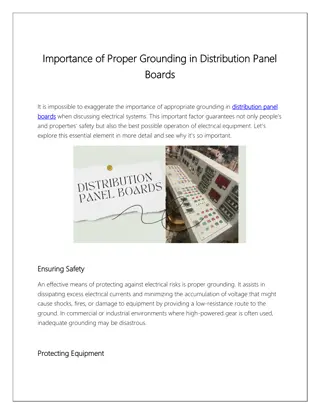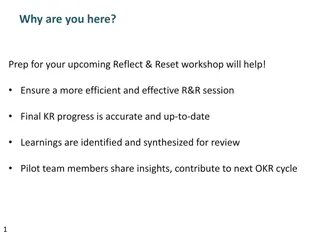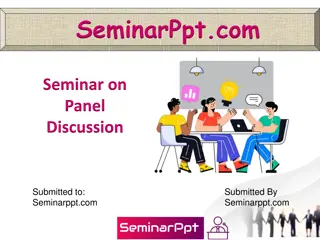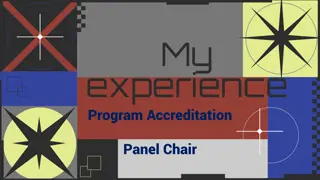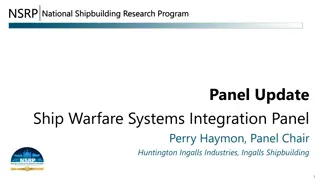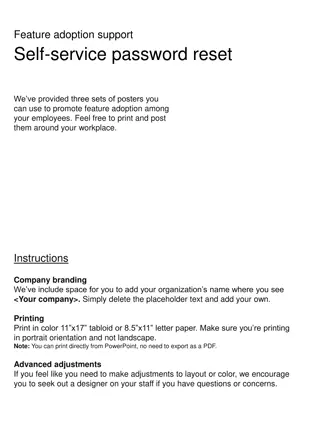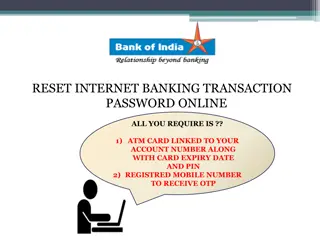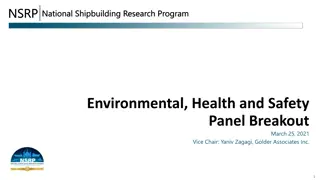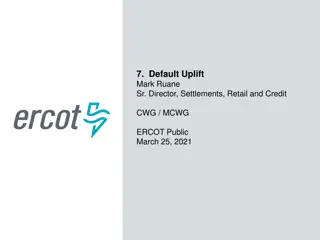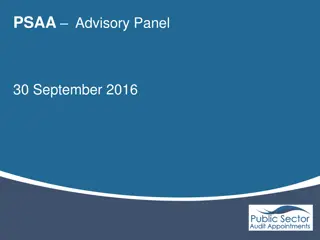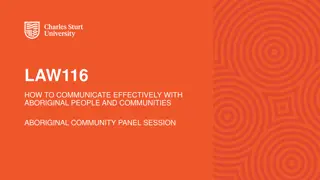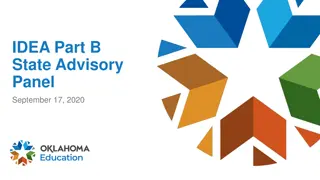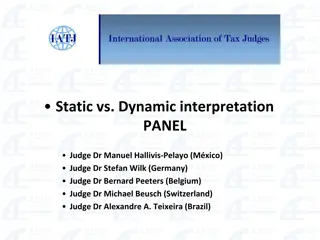Challenging Our Default: Pushing the Reset on Education Panel Discussion Highlights
Panel discussion highlights on redefining education include starting career education in middle school, enhancing student experiences, fostering career exploration, addressing funding and staffing challenges, and promoting soft skills development for students. The speakers emphasize the importance of innovation, local decision-making, and parental involvement in shaping students' educational journeys.
Download Presentation

Please find below an Image/Link to download the presentation.
The content on the website is provided AS IS for your information and personal use only. It may not be sold, licensed, or shared on other websites without obtaining consent from the author. Download presentation by click this link. If you encounter any issues during the download, it is possible that the publisher has removed the file from their server.
E N D
Presentation Transcript
Challenging our Default: Pushing the Reset on Education February 21, 2022 8:30 a.m. - 12:00 p.m.
Welcome Introductions Please sign in using the LINK in the chat Housekeeping Link to slides Link to agenda Navigating Zoom Video Controls Microphone Chat Breakout Rooms
Panel Deana Jones: Employee Relations Manager, Wahl Clipper Eric Lasky: Asst Principal Ridgewood HS Heather Penczak: Director of Innovation & Implementation, EdSystems Melvin Harrison: Director for Academic Affairs, ICCB Erica Thieman: Director of K-12 Curricuum & Instruction, ISBE
Reflecting on Panel Discussion 9:20 - 9:45 a.m. Gail Wright Agreed with Deana at Wahl Clipper everything is an emergency and social-emotional Career Education has to start in Middle School, making school meaningful and why are we here, add relevance to why in school More experiences the better in Middle School to find out what they do or don t like to do Spend more time with the Junior High School Students, having the vision is important Locally STEM Feast career opportunities (FALL, October) Middle School intro to engineering, nursing, etc. and is fun WACC Tour, MIT in Morrison 7th grade intro program Opportunity to look at careers Union Expo in Rockford (19 Unions) Opportunities, but can t take eadvantage of them Businesses need to communicdate better with schools Clearinghouse of ideas cocntactss for businesses SVCC - Mfg Day in October, specialization of tour - Coordinated effort for WACC and SVCC Tour on same day Fitting into class schedules Career Exploration and changes in what post secondary feels is important, Career Tech Ed now becoming acceptable as credit HOME
Reflecting on Panel Discussion 9:20 - 9:45 a.m. Stacey Dinges Using the comments from Wahl Clippers - into the classroom How do we break the wheel ? Decisions made locally, how do we implement without going through all the hoops Trust us educators ; let us innovate! Create a list of the myths ; how do we give them bread crumbs to a career exposure to career exploration at an early age - parental involvement is KEY Need more funding, more staff contradiction in giving staff more responsibility Only so many tries to do-over ...eventually have to show mastery Adults in students lives need to be more flexible in dealing with students; coping skills, given the opportunity for a second chance SOFT SKILLS ! HOME
Reflecting on Panel Discussion 9:20 - 9:45 a.m. Chanda McDonnell Policicie like late work Meet the students where they are, sometimes late work is needed double edge sword Talk to students perception data very helpful communication: freshman course to introduce soft skills, do we need a senior course to teach soft skills as well, we as professionals need to be open to communication, purposeful communication, 2-way street, outreach open-ended question where there is no right or wrong answer HOME
Reflecting on Panel Discussion 9:20 - 9:45 a.m. Heather Waninger Students are given task after task but are never really given the chance to be independent or try to be responsible to succeed or fail. We have to give students responsibility? behavior plate vs academic plate. How can I learn what they know even if they don t turn things in on time Students don t have knowledge or don t have the behavior component . How do you communicate with parents they have the academic knowledge but maybe not soft skills or the other way around. How do we report information about knowledge vs. soft skills to employers and higher education How do we teach students to read to learn from textbooks or information found online. Expectations for students to learn from text or online information but do they really know they can do that? How are we using HOME
College & Career Readiness Summit Keynote College & Career Readiness Summit February 21, 2022 Stephanie Malia Krauss is the author of Making It: What Today s Kids Need for Tomorrow s World as well as the founder + principal of First Quarter Strategies. She serves as a senior advisor to Jobs for the Future (JFF), senior fellow with the CERES Institute for Children and Youth at Boston University, senior fellow with Education Northwest, and staff consultant to the Youth Transition Funders Group (YTFG). Stephanie works nationally on issues of youth readiness, child well-being, and the future of work and learning. Through her work and writing, Stephanie is relentlessly focused on what young people need to be ready for the world, and what the world needs to be ready for them.
Reflecting on the 4 Currencies: COMPETENCIES 10:50 - 11:20 a.m. Facilitator: Chanda McDonnell Change our paradigm for preparation (how we prepare the students and what are we preparing them for) Change our trajections change our thinking about preparing for a career that we will stay in for 40 plus years Start early possibly 5th grade for exposure and connections make the competencies a talking point with students to teach them the terminology to have the words to describe the way they feel Transferable skills versus soft skills how do we fit them in students need real life experiences in school HOME
Reflecting on the 4 Currencies: CONNECTIONS 10:50 - 11:20 a.m. Facilitator: Gail Wright Communication struggle with for this generation Leasrning how to communicate better Small talk, basic communicating Practice small talk connections with students Why it is important to make friends, answering the phone skills, communicating to foster connections Speech class Resumes and who will speak on your behalf for a job Student who is going through finding out about the person (Secret Service) Chat time at beginning of class, interpersonal skills better without devices Use slides we have today to go over with students, what skills do we have, what don t we have MS need career pathway class special to find time to explicitly teach them communication skills, intentional time and embed across curriculum needs to be everywhere Remind teaching staff, few minutes at end of period talk with person next to them (give them a conversation topic) Foster connections intentionally in online format Getting students more engaged online Place for this and only option for some Mentee, ask question see if similar answers See what others think Network up and network down, learn from everyone We are moving in right direction with Pathways and Mentors, SVCC tries to collaborate and open doors Keep networking HOME
Reflecting on the 4 Currencies: CREDENTIALS 10:50 - 11:20 a.m. Facilitator: Heather Waninger Questions: How do we give them the chance to explore the next step in earning credentials What are the community partners that will help? and how can we get more resources to support this work? How do we follow up with all this information in the coming weeks? Thoughts: Students don t have enough informations about the about of credentials. Not all schools don t know either. Jobs are retraining skills how do we prep them with needed skills. Jobs want to train on the job but they won t hire without a degree or experience each staff member need to be able to connect and have conversions with students about next steps. We are needing to have SUCCESS conversion with students. Success means career and academic HOME
Reflecting on the 4 Currencies: CASH 10:50 - 11:20 a.m. Facilitator: Stacey Dinges Students are mainly interested in money - students concerned about short -term expenses Students may not realize they will start an entry level position ; instant gratification. Some students are learning from their parents who have lost their job. Access to capital is important but need to start somewhere maybe there is an unrealistic expectation as to how you get to the top So many students are working and trying to manage both school & work. Short term wants put over the long term vision of being successful Finding the balance between workplace responsibilities and pursuing other interests HOME
College & Career Readiness Practical Implementation College & Career Readiness Summit February 21, 2022 What does this mean our school(s) and district? Connect with the vocational center locally and MIT to see what jobs and training are available. Expanded exposure for students & teachers is critical (WPW?) CCRI has significant connections to mental health and social emotional learning Consider opt out versus opt in opportunities for students What are readiness rich environments and experiences in our district? How can we ensure access for ALL students? What does working while in school keep students out of? How can we coach students into capitalizing on these experiences to propel them forward? Co-developed/co designed opportunities opportunities for student learning between home-school-work-community. Blurred lines More conversations about high value and high growth careers How can we look at credentials as the problems, issues, and ideas that students have? What credentials are valued and needed? Be discerning with microcredentials, nanocredentials, etc. It needs to have employer recognition. Build a culture inside of each building so that each educator is a connection
College & Career Readiness Practical Implementation College & Career Readiness Summit February 21, 2022 What can I/we start doing and stop doing? Quality is better and more important than quantity - don t add to the crumble How can I reduce the cognitive load without getting rid of the quality of the experience? Reduce homework. Make work meaningful.
College & Career Readiness Next Steps College & Career Readiness Summit February 21, 2022 Stipend information Professional Learning Credit Evaluation Link




